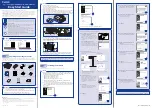
-15-
Overview of the measuring modes
The measuring tool has the following measuring
modes:
–
<Object Detection>
: For detecting objects in
walls, floors and ceilings,
–
<Leakage Detection>
: For detecting leaks,
–
<Distance Measurement>
: For measuring
distances.
You can change the measuring mode in the main
menu (see "Main Menu", page 20).
Measuring Mode <Object Detection>
Method of Operation (see figure B)
The detection tool checks the
base material of sensor area
(9)
in measurement direction
A
to
the displayed measuring depth.
Measurement is possible only
during movement of the
detection tool in the direction of
travel
B
and for a measuring
distance of at least 4 in (10 cm).
Move the detection tool in a
straight line with light pressure over the wall
so that the wheels remain in firm contact with
the wall. The object depth and, if possible, the
object material, are indicated on the display.
Optimal results are achieved when the measured
distance is at least 15.75 in (40 cm) and the
detection tool is moved slowly over the entire
location. This method of operation ensures
reliable detection of outer object edges that run
transverse to the detection tool’s movement
direction.
Always move crossways over the area to be
checked.
If several objects are located one over the other
in the wall, the object that is indicated in the
display is the one nearest to the surface.
The representation of the material types of
detected objects in the display
(16)
can deviate
from the actual object material types. This
applies particularly for very thin objects, which
are represented thicker in the display. Large
cylindrical objects (e.g. plastic or water pipes)
can appear in the display smaller than they
actually are.
Detectable Objects
– Plastic pipes (e.g. water-filled plastic pipes, as
used in floor/wall-heating systems, with at
least 3/4” in diameter; empty pipes with at
least 1” in diameter)
– Electrical wiring (independent of whether
carrying voltage or not)
– Three-phase wiring (e.g. to the stove)
–
Low-voltage wiring (e.g. for door bell,
telephone)
– Metal pipes, bars, studs of any type (e.g. steel,
copper, aluminim)
– Reinforcing steel
– Wooden studs
– Hollow spaces
Special measuring cases
Unfavorable conditions fundamentally impair the
measuring result:
– Multi-layered walls
– Empty plastic pipes and wooden beams in
cavities and lightweight partition walls
– Objects lying at an angle in the wall
– Metal surfaces and moist areas; if in a wall,
these may be displayed as objects under
certain conditions (e.g. high moisture
content). Please note that concrete requires
several months to dry out completely.
– Cavities in a wall; these may be displayed as
objects
– Proximity to devices that generate strong
magnetic or electromagnetic fields, e.g.
mobile phone base stations or generators
Before drilling, sawing or routing into walls,
refer to other sources of information to
ensure that you eliminate hazards.
Since the
measuring results can be influenced by
ambient conditions or the wall material, there
may be a hazard even though the indicator
does not indicate an object within the sensor
range.
Change the wall type
Always set the appropriate wall type for best
possible measuring results. To do this,
repeatedly press the left-hand
(14)
or right-hand
arrow button
(7)
until the required wall type is
displayed. Press the red start button
(16)
to
accept the selection.
The maximum measuring depth is 3.15 in (8 cm).
Any deviations from this value are described in
the individual wall types and views.
Wall Type <Brick / Universal>
The
<Brick / Universal>
wall type is suitable for
most applications in solid masonry or other
Operating Instructions
SEN
SO
SEN
SO
OR
A
B
B
9
Dtect200C_2610067510_01-22.qxp_D-tect200 1/18/22 1:43 PM Page 15
Summary of Contents for D-tect200C
Page 3: ... 3 1 5 19 5 21 22 20 Dtect200C_2610067510_01 22 qxp_D tect200 1 18 22 1 43 PM Page 3 ...
Page 4: ... 4 A 23 9 10 Dtect200C_2610067510_01 22 qxp_D tect200 1 18 22 1 43 PM Page 4 ...
Page 5: ... 5 A A B B B x x y y Dtect200C_2610067510_01 22 qxp_D tect200 1 18 22 1 43 PM Page 5 ...
Page 6: ... 6 C 25 24 26 27 24 Dtect200C_2610067510_01 22 qxp_D tect200 1 18 22 1 43 PM Page 6 ...
Page 55: ... 55 Notes Remarques Notas Dtect200C_2610067510_01 22 qxp_D tect200 1 18 22 1 44 PM Page 55 ...
















































